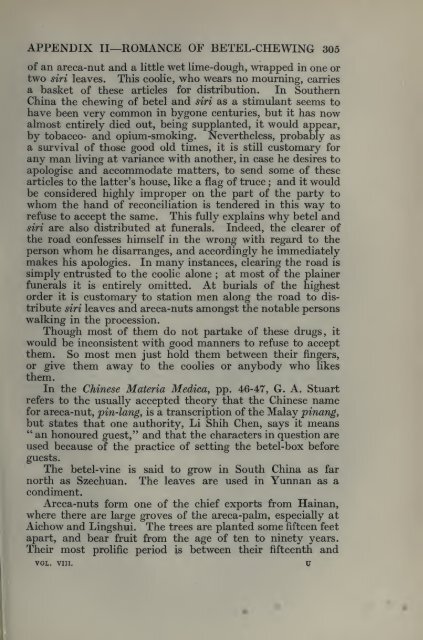- Page 3:
m 11 M mm m
- Page 7 and 8:
LSansK THE OCEAN OF STORY BEING G.
- Page 9 and 10:
IT FOREWORD is a high honour but al
- Page 11 and 12:
FOREWORD vii not equally absurd to
- Page 13 and 14:
FOREWORD ix though we may differ as
- Page 15 and 16:
FOREWORD xi Indeed the question " w
- Page 17 and 18:
FOREWORD xiii the head of an asceti
- Page 19 and 20:
FOREWORD xv But, when all is said a
- Page 21 and 22:
FOREWORD xvii attributed to a natur
- Page 23 and 24:
or Gypsy 1 ; FOREWORD xix and what
- Page 25 and 26:
FOREWORD xxi forms may the results
- Page 27 and 28:
FOREWORD xxiii Another good reason
- Page 29 and 30:
FOREWORD xxv reasons it does not fo
- Page 31 and 32:
FOREWORD xxvii Mr Penzer as his mod
- Page 33 and 34:
FOREWORD xxix need not be very elab
- Page 35 and 36:
CONTENTS BOOK XIII: MADIRAVATI Auth
- Page 37 and 38:
CONTENTS xxxiii CHAPTER CXII contin
- Page 39:
CONTENTS xxxv APPENDIX II PAGE The
- Page 43:
THE OCEAN OF STORY
- Page 46 and 47:
2 THE OCEAN OF STORY region, being,
- Page 48 and 49:
4 THE OCEAN OF STORY for you, she w
- Page 50 and 51:
6 THE OCEAN OF STORY roaming about
- Page 52 and 53:
8 THE OCEAN OF STORY " ' There I sa
- Page 54 and 55:
10 THE OCEAN OF STORY neighbours, o
- Page 56 and 57:
12 THE OCEAN OF STORY " She immedia
- Page 58 and 59:
14 THE OCEAN OF STORY of joy, and I
- Page 60 and 61:
16 THE OCEAN OF STORY Hereafter I w
- Page 62 and 63:
18 THE OCEAN OF STORY NOTE 1. THE U
- Page 64 and 65:
20 THE OCEAN OF STORY sun's norther
- Page 66 and 67:
22 THE OCEAN OF STORY by violent gr
- Page 68 and 69:
24 THE OCEAN OF STORY But, however
- Page 70 and 71:
26 THE OCEAN OF STORY from my fathe
- Page 72 and 73:
CHAPTER CVI THEN a certain Gandharv
- Page 74 and 75:
30 THE OCEAN OF STORY must be a hai
- Page 76 and 77:
32 THE OCEAN OF STORY raining joy i
- Page 78 and 79:
34 THE OCEAN OF STORY visit my frie
- Page 80 and 81:
36 THE OCEAN OF STORY [M] " So if I
- Page 82 and 83:
38 THE OCEAN OF STORY form, with dr
- Page 84 and 85:
40 THE OCEAN OF STORY another argum
- Page 86 and 87:
42 THE OCEAN OF STORY court cleft a
- Page 88 and 89:
44 THE OCEAN OF STORY 166. Story of
- Page 90 and 91:
46 THE OCEAN OF STORY said this, sh
- Page 92 and 93:
48 THE OCEAN OF STORY you to conque
- Page 94 and 95:
50 THE OCEAN OF STORY So I will to-
- Page 96 and 97:
52 THE OCEAN OF STORY shalt have pr
- Page 98 and 99:
54 THE OCEAN OF STORY " When I was
- Page 100 and 101:
56 THE OCEAN OF STORY my destinatio
- Page 102 and 103:
58 THE OCEAN OF STORY " When I was
- Page 104 and 105:
60 THE OCEAN OF STORY and, thanks t
- Page 106 and 107:
62 THE OCEAN OF STORY When the batt
- Page 108 and 109:
64 THE OCEAN OF STORY say again and
- Page 110 and 111:
66 THE OCEAN OF STORY lovingly ente
- Page 112 and 113:
68 THE OCEAN OF STORY Naravahanadat
- Page 114 and 115:
INVOCATION BOOK XV: MAHABHISHEKA CH
- Page 116 and 117:
72 THE OCEAN OF STORY Then the herm
- Page 118 and 119:
74 THE OCEAN OF STORY a battle betw
- Page 120 and 121:
76 THE OCEAN OF STORY of Mahamaya,
- Page 122 and 123:
78 THE OCEAN OF STORY by the sacrif
- Page 124 and 125:
80 THE OCEAN OF STORY Then Mandarad
- Page 126 and 127:
THEN, CHAPTER CX the next day, the
- Page 128 and 129:
84 THE OCEAN OF STORY him and said
- Page 130 and 131:
86 THE OCEAN OF STORY that seemed t
- Page 132 and 133:
88 THE OCEAN OF STORY valour, he ap
- Page 134 and 135:
90 THE OCEAN OF STORY when he was b
- Page 136 and 137:
92 THE OCEAN OF STORY the magic pow
- Page 138 and 139:
BOOK XVI : SURATAMANJARI INVOCATION
- Page 140 and 141:
96 THE OCEAN OF STORY with cardamom
- Page 142 and 143:
98 THE OCEAN OF STORY dependent on
- Page 144 and 145:
100 THE OCEAN OF STORY female towar
- Page 146 and 147:
102 THE OCEAN OF STORY the minister
- Page 148 and 149:
104 THE OCEAN OF STORY In the midst
- Page 150 and 151:
106 THE OCEAN OF STORY him I was ma
- Page 152 and 153:
108 THE OCEAN OF STORY eats the hea
- Page 154 and 155:
110 THE OCEAN OF STORY protects." T
- Page 156 and 157:
112 THE OCEAN OF STORY companions :
- Page 158 and 159:
114 THE OCEAN OF STORY So thou art
- Page 160 and 161:
116 THE OCEAN OF STORY thought that
- Page 162 and 163:
118 THE OCEAN OF STORY 168. Story o
- Page 164 and 165:
120 THE OCEAN OF STORY the king, in
- Page 166 and 167:
122 THE OCEAN OF STORY them. Howeve
- Page 168 and 169:
CHAPTER CXIII WHEN Naravahanadatta,
- Page 170 and 171:
126 THE OCEAN OF STORY like the ful
- Page 172 and 173:
128 THE OCEAN OF STORY city, accomp
- Page 174 and 175:
130 THE OCEAN OF STORY In the meanw
- Page 176 and 177:
INVOCATION GLORY BOOK XVII: PADMAVA
- Page 178 and 179:
134 THE OCEAN OF STORY Somaprabha,
- Page 180 and 181:
136 THE OCEAN OF STORY and remained
- Page 182 and 183:
138 THE OCEAN OF STORY time meet to
- Page 184 and 185:
140 THE OCEAN OF STORY other. Terri
- Page 186 and 187:
142 THE OCEAN OF STORY and in order
- Page 188 and 189:
CHAPTER CXV 170. Story of King Brah
- Page 190 and 191:
146 THE OCEAN OF STORY Vidyadharas,
- Page 192 and 193:
148 THE OCEAN OF STORY broke his fa
- Page 194 and 195:
150 THE OCEAN OF STORY At this poin
- Page 196 and 197:
152 THE OCEAN OF STORY done, he alo
- Page 198 and 199:
154 THE OCEAN OF STORY of the Gandh
- Page 200 and 201:
THEN CHAPTER CXVI 170b. Muktaphalak
- Page 202 and 203:
158 THE OCEAN OF STORY of mine has
- Page 204 and 205:
160 THE OCEAN OF STORY delighted th
- Page 206 and 207:
162 THE OCEAN OF STORY the gods. An
- Page 208 and 209:
IN CHAPTER CXVII 170b. Muktdphalake
- Page 210 and 211:
166 THE OCEAN OF STORY Manoharika,
- Page 212 and 213:
168 THE OCEAN OF STORY her round by
- Page 214 and 215:
170 THE OCEAN OF STORY peculiarity,
- Page 216 and 217:
172 THE OCEAN OF STORY have to-day
- Page 218 and 219:
174 THE OCEAN OF STORY " My beloved
- Page 220 and 221:
176 THE OCEAN OF STORY command, and
- Page 222 and 223:
WHILE CHAPTER CXVIII 170b. Muktdpha
- Page 224 and 225:
180 THE OCEAN OF STORY gave him the
- Page 226 and 227:
182 THE OCEAN OF STORY preparation
- Page 228 and 229:
184 THE OCEAN OF STORY of Pasupati
- Page 230 and 231:
186 THE OCEAN OF STORY go to their
- Page 232 and 233:
188 THE OCEAN OF STORY and fall at
- Page 234 and 235:
190 THE OCEAN OF STORY treasure-hou
- Page 236 and 237:
192 THE OCEAN OF STORY deeply in lo
- Page 238 and 239:
194 THE OCEAN OF STORY some days Sv
- Page 240 and 241:
196 THE OCEAN OF STORY Having said
- Page 242 and 243:
198 THE OCEAN OF STORY will remain
- Page 244 and 245:
200 THE OCEAN OF STORY beloved. Obs
- Page 246 and 247:
202 THE OCEAN OF STORY seem to tall
- Page 248 and 249:
204 THE OCEAN OF STORY Prince Mukta
- Page 250 and 251:
206 THE OCEAN OF STORY female heart
- Page 252 and 253:
208 THE OCEAN OF STORY thy sake aba
- Page 255:
APPENDIX I
- Page 258 and 259:
214 THE OCEAN OF STORY The stealing
- Page 260 and 261:
216 THE OCEAN OF STORY There is per
- Page 262 and 263:
218 THE OCEAN OF STORY at all close
- Page 264 and 265:
220 THE OCEAN OF STORY accept such
- Page 266 and 267:
222 THE OCEAN OF STORY Now let us l
- Page 268 and 269:
224 THE OCEAN OF STORY ease with wh
- Page 270 and 271:
226 THE OCEAN OF STORY only in thei
- Page 272 and 273:
228 THE OCEAN OF STORY We return to
- Page 274 and 275:
230 THE OCEAN OF STORY " From what
- Page 276 and 277:
232 THE OCEAN OF STORY the Moluccas
- Page 278 and 279:
234 THE OCEAN OF STORY like, she st
- Page 281 and 282:
APPENDIX II THE ROMANCE OF BETEL-CH
- Page 283 and 284:
APPENDIX II ROMANCE OF BETEL-CHEWIN
- Page 285 and 286:
APPENDIX II ROMANCE OF BETEL-CHEWIN
- Page 287 and 288:
APPENDIX II ROMANCE OF BETEL-CHEWIN
- Page 289 and 290:
APPENDIX II ROMANCE OF BETEL-CHEWIN
- Page 291 and 292:
APPENDIX II ROMANCE OF BETEL-CHEWIN
- Page 293 and 294:
APPENDIX II ROMANCE OF BETEL-CHEWIN
- Page 295 and 296:
APPENDIX II ROMANCE OF BETEL-CHEWIN
- Page 297 and 298: APPENDIX II ROMANCE OF BETEL-CHEWIN
- Page 299 and 300: APPENDIX II ROMANCE OF BETEL-CHEWIN
- Page 301 and 302: APPENDIX II ROMANCE OF BETEL-CHEWIN
- Page 303 and 304: APPENDIX II ROMANCE OF BETEL-CHEWIN
- Page 305 and 306: APPENDIX II ROMANCE OF BETEL-CHEWIN
- Page 307 and 308: APPENDIX II ROMANCE OF BETEL-CHEWIN
- Page 309 and 310: APPENDIX II ROMANCE OF BETEL-CHEWIN
- Page 311 and 312: APPENDIX II ROMANCE OF BETEL-CHEWIN
- Page 313 and 314: APPENDIX II ROMANCE OF BETEL-CHEWIN
- Page 315 and 316: APPENDIX II ROMANCE OF BETEL-CHEWIN
- Page 317 and 318: APPENDIX II ROMANCE OF BETEL-CHEWIN
- Page 319 and 320: APPENDIX II ROMANCE OF BETEL-CHEWIN
- Page 321 and 322: APPENDIX II ROMANCE OF BETEL-CHEWIN
- Page 323 and 324: APPENDIX II ROMANCE OF BETEL-CHEWIN
- Page 325 and 326: APPENDIX II ROMANCE OF BETEL-CHEWIN
- Page 327 and 328: APPENDIX II ROMANCE OF BETEL-CHEWIN
- Page 329 and 330: APPENDIX II ROMANCE OF BETEL-CHEWIN
- Page 331 and 332: APPENDIX II ROMANCE OF BETEL-CHEWIN
- Page 333 and 334: APPENDIX II ROMANCE OF BETEL-CHEWIN
- Page 335 and 336: APPENDIX II ROMANCE OF BETEL-CHEWIN
- Page 337 and 338: APPENDIX II ROMANCE OF BETEL-CHEWIN
- Page 339 and 340: APPENDIX II ROMANCE OF BETEL-CHEWIN
- Page 341 and 342: APPENDIX II ROMANCE OF BETEL-CHEWIN
- Page 343 and 344: APPENDIX II ROMANCE OF BETEL-CHEWIN
- Page 345 and 346: APPENDIX II ROMANCE OF BETEL-CHEWIN
- Page 347: APPENDIX II ROMANCE OF BETEL-CHEWIN
- Page 351 and 352: APPENDIX II ROMANCE OF BETEL-CHEWIN
- Page 353 and 354: APPENDIX II ROMANCE OF BETEL-CHEWIN
- Page 355 and 356: APPENDIX II ROMANCE OF BETEL-CHEWIN
- Page 357 and 358: APPENDIX II ROMANCE OF BETEL-CHEWIN
- Page 359 and 360: APPENDIX II ROMANCE OF BETEL-CHEWIN
- Page 361 and 362: APPENDIX II ROMANCE OF BETEL-CHEWIN
- Page 363: APPENDIX II ROMANCE OF BETEL-CHEWIN
- Page 366 and 367: 322 THE OCEAN OF STORY Aupapdtikd S
- Page 368 and 369: 324 THE OCEAN OF STORY Chandasimha,
- Page 370 and 371: 326 THE OCEAN OF STORY Gomeda-dvipa
- Page 372 and 373: 328 THE OCEAN OF STORY Kaustubha je
- Page 374 and 375: 330 THE OCEAN OF STORY Milton, Comu
- Page 376 and 377: 332 THE OCEAN OF STORY Ralston, W.
- Page 378 and 379: 334 THE OCEAN OF STORY Sravasti, ci
- Page 380 and 381: 336 THE OCEAN OF STORY Vijayasena,a
- Page 382 and 383: 338 THE OCEAN OF STORY Anmerkungen
- Page 384 and 385: 340 THE OCEAN OF STORY Blue lotuses
- Page 386 and 387: 342 THE OCEAN OF STORY Clove trade,
- Page 388 and 389: 344 THE OCEAN OF STORY East Indian
- Page 390 and 391: 346 THE OCEAN OF STORY Former birth
- Page 392 and 393: 348 THE OCEAN OF STORY Identificati
- Page 394 and 395: 350 THE OCEAN OF STORY Library, Apo
- Page 396 and 397: 352 THE OCEAN OF STORY Mouth when s
- Page 398 and 399:
354 THE OCEAN OF STORY Pouring wate
- Page 400 and 401:
356 THE OCEAN OF STORY Science of d
- Page 402 and 403:
358 THE OCEAN OF STORY tf Swan- Mai
- Page 404 and 405:
360 THE OCEAN OF STORY Two continue
- Page 406:
Printed in Great Britain by The Riv
- Page 411:
f ^ :^ m. Ijjft^iil^*-' ! w *%\ tff






